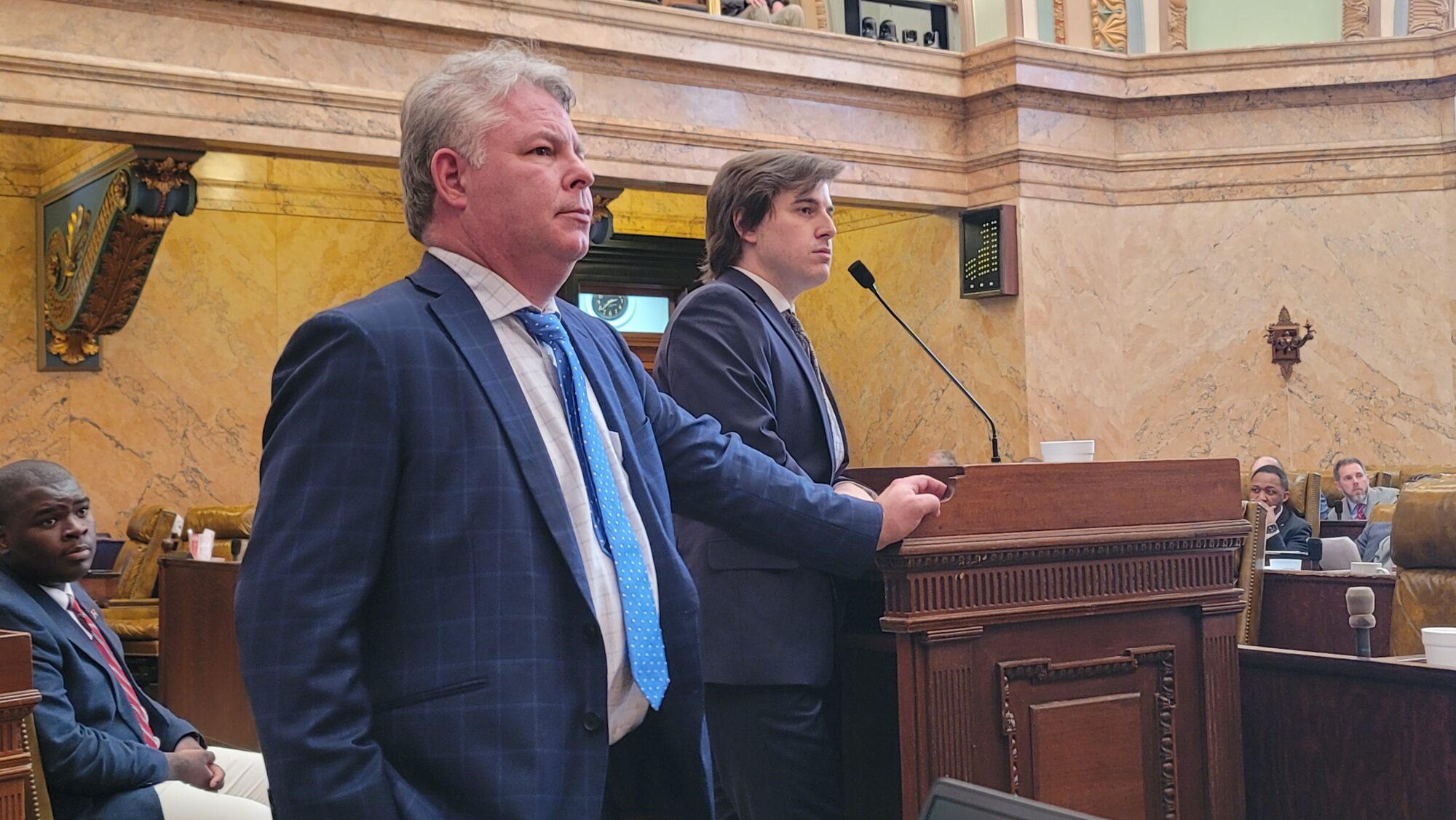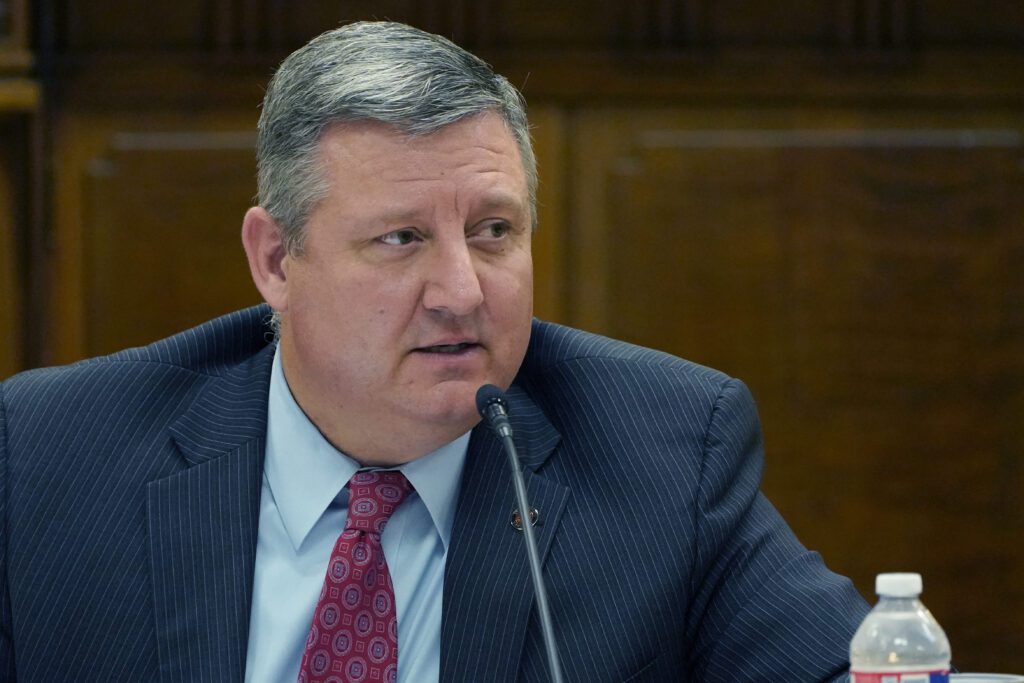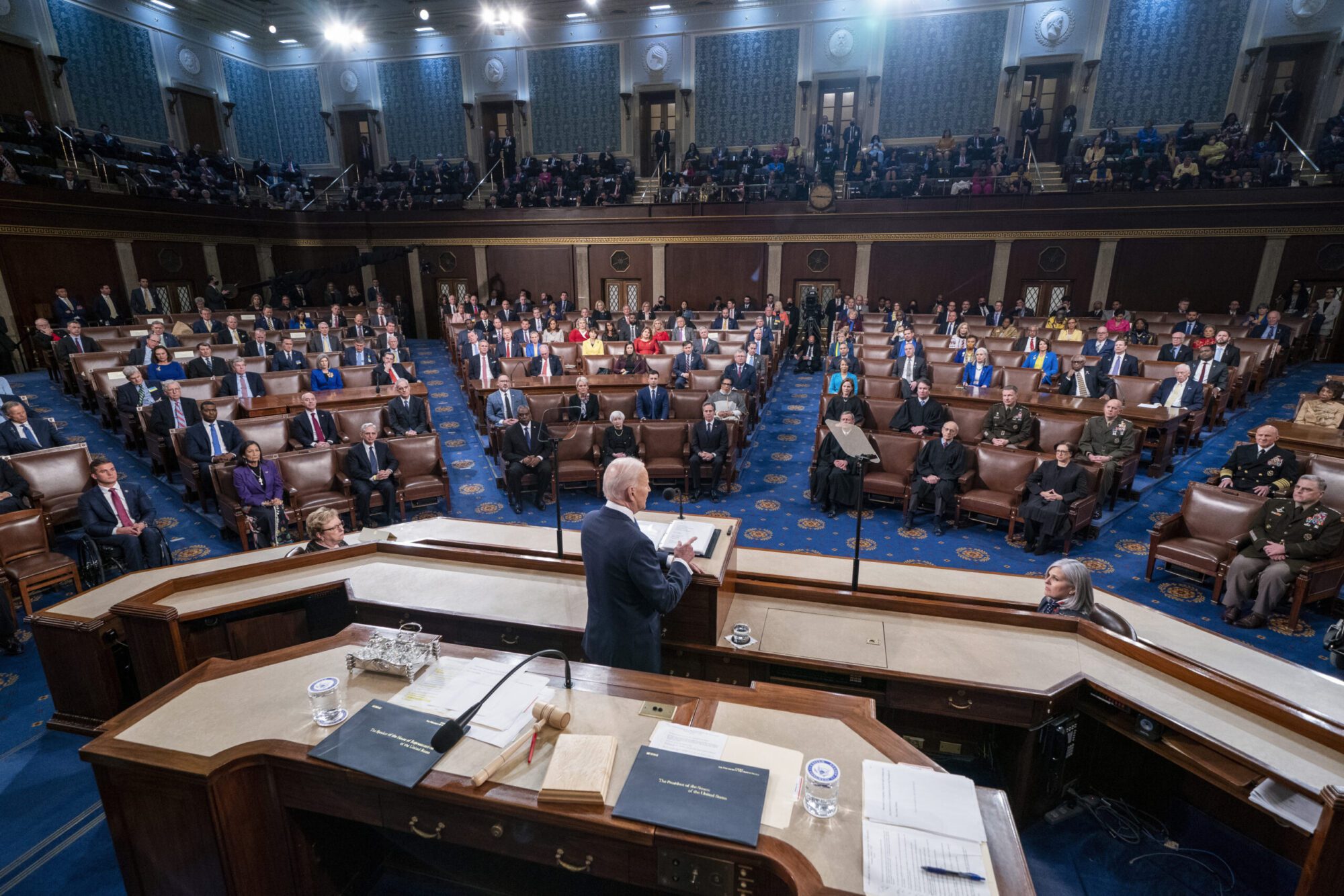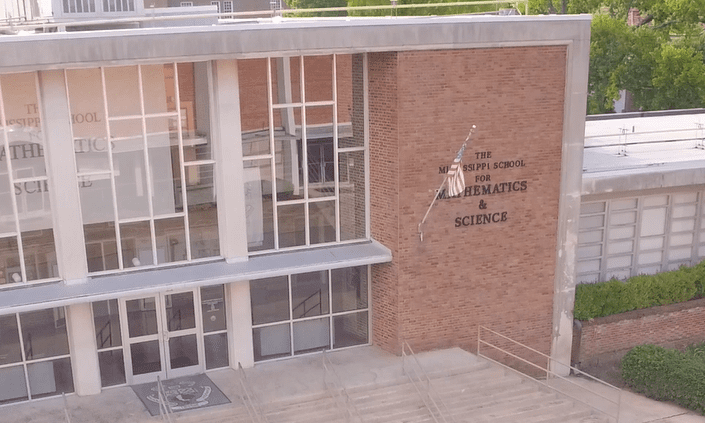
From left, Rep. Rob Roberson and Rep. Kent McCarty present HB 1453, which would replace the current MAEP funding formula with the INSPIRE Act, to the floor of the House of Representatives on Wednesday. (Photo by Jeremy Pittari | Magnolia Tribune)
- The proposed new INSPIRE Act in the House could add $240 million to K-12 funding while the Senate’s tweaks to MAEP could increase education spending by $210 million.
Two bills that would change the way Mississippi’s education funding system operates have survived the legislative deadline for committees to report out general bills. Another bill that could set up a form of public school choice gained some traction on Tuesday.
Senate Bill 2332 and House Bill 1453 passed out of committee in their respective chambers before Tuesday’s deadline. Both aim to change the way the state’s education system is funded.
HB 1453, also known as the Investing in the Needs of Students to Prioritize, Impact and Reform Education (INSPIRE) Act of 2024, would create a weighted system supporters believe would better fund the state’s K-12 education system.
Authored by State Rep. Rob Roberson (R-HD 43), chairman of the House Education Committee, the bill was the first to be submitted this session that tackled what many lawmakers believe to be the antiquated and ineffective Mississippi Adequate Education Program, or MAEP funding formula that was established in 1997.
If passed, INSPIRE will replace the current MAEP formula, potentially providing an additional $240 million in education funding and ensuring school districts that need the most funding will receive it, particularly those with a lower ad valorem tax base. That means some districts will see less funding as the hold harmless provisions expire within four years as part of the bill, but districts in most need will see funding increases.
School districts with the strongest tax bases will get less in state funding, said House Education Committee Vice Chair State Rep. Kent McCarty (R-HD 101) after the bill was introduced on the House floor on Wednesday. Instances where a district would get less funding through the INSPIRE Act are those currently benefitting from hold harmless provisions under MAEP. INSPIRE would set a four-year time frame where the hold harmless provisions would run out incrementally each year. Hold harmless provisions benefit districts with declining enrollment numbers.
Rep. Roberson’s funding formula in the INSPIRE Act increases the base amount of $6,650 per student to $6,600, and then applies weighted percentages above that figure for specific metrics. For instance, a weight of 30% above the base amount is applied for low-income students and 20% is applied for students who are learning English as a second language. The highest of weights cover the various disabilities a student may face, while the lowest of weights provide funding to ensure gifted classes are offered. There are percentages included for Career and Technical Education courses and for districts with less than 8 students per square mile to assist those with sparse populations.
Wednesday afternoon, after more than an hour of discussion on the House floor, the bill passed by a vote of 92-13.
In the Senate, SB 2332, authored by Senate Education Committee Chairman State Sen. Dennis DeBar (R-SD 43), keeps the structure of MAEP but adjusts the formula in such a way so as to provide an additional $210 million to the education allocation while providing superintendents and other school district administrators with a clearer financial picture to plan for staffing and other expenses prior to the start of the school year.

DeBar’s bill is similar to legislation he introduced during the 2023 session which died in the House of Representatives.
As previously reported, SB 2332 proposes for each of the fiscal years between the recalculation of the base student cost, the base student cost be increased by an amount equal to 25 percent of the base student cost for the previous fiscal year, multiplied by the twenty-year average annual change in the rate of inflation. The current annual growth factor for non-recalculation years is 40 percent.
Another change to MAEP proposed in the Senate bill relates to the local contribution provided by each school district, increasing it from the current rate of 27 percent or 28 mills to 29.5 percent or 28 mills, whichever is less. The goal is to make it more equitable for all school districts.
The Senate has not yet taken up SB 2332 on the floor.
School Choice variation bill
A school choice bill was also passed this week, and made it through the deadline process.
SB 2691, also authored by Senate Education Committee Chair DeBar, was taken up in the Senate Education Committee Tuesday. It proposes changes to current statutes that would allow a student to attend a public school district other than the one they are assigned, effectively making it easier by taking away the veto power the student’s current school district now holds. However, the receiving school district will still be tasked with accepting the transfer request by the district’s next School Board of Trustees meeting. If that matter is not taken up by the School Board at that time, the request is automatically denied.
Sen. DeBar said that before a school district can consider accepting a transfer request, the district will have to determine how many students it can effectively educate within the district before considering the acceptance of any transfer student.
If the student lives more than 30 miles from the transfer school, the family will be responsible for providing transportation to the school. There is no limit on the distance of a school a student can transfer to.
Any MAEP dollars for that student will follow them to the new district, and if tuition is needed, it will be up to that district to determine that cost, Sen. Debar added.
In relation to restrictions on when students athletes can join a team at the new school, the bill would make a change to the Mississippi High School Athletics Association’s current rule, which states if a student transfers in the middle of a school year, they are ineligible to play a sport at the new school for a term of one year. DeBar’s legislation would allow that student to be eligible to join an athletics program at the new school in the fall of the following school year.
“So, if a student plays football in the fall at Greene County you can’t transfer to Petal or Sumrall to play baseball in the spring. Your athletic eligibility is determined by your fall enrollment,” Sen. DeBar said. “I believe that currently the high school athletic association requires you to sit out a year if you transfer. This eliminates that prohibition. We don’t want students to be punished for transferring to a school that he or she wants to transfer to.”
The bill now awaits consideration by the full Senate.










